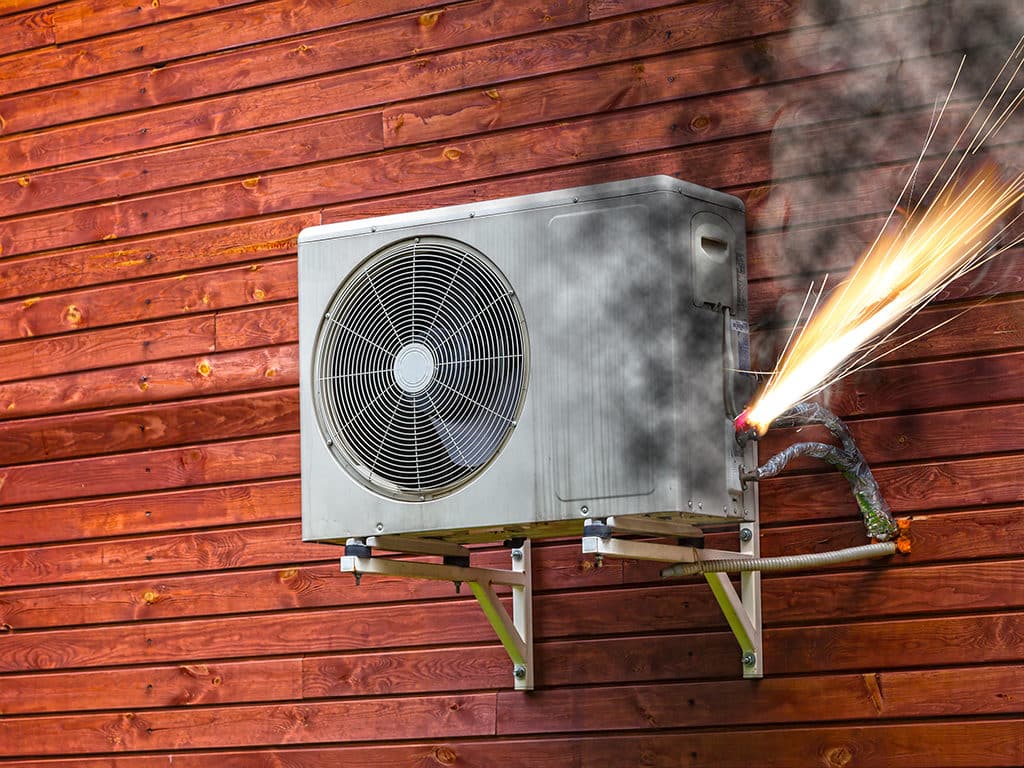
5 Common Heating and AC Fire Hazards | Tips from Your Fort Worth, TX HVAC Repair Provider
Photo By Nightman1965 at Shutterstock
Oftentimes, people ask whether or not heating and AC units can catch fire. To most people, the idea of an HVAC fire hazard is nothing short of a surprise. Imagine, it’s mid of July, and your AC is working in full swing, something inside your AC unit goes wrong, resulting in a fire. Or the furnace is burning and all of a sudden, a fire breaks out. Either of the two scenarios is hard, even to fathom. Although unimaginable, these scenarios are still possible. Which is why, you need to invest in heating and AC repair in the Fort Worth, TX area.
One of the several gas furnace dangers is carbon monoxide damage. Remember, your HVAC units, if left untreated can result in a fire hazard. Therefore, you must hire a professional HVAC service provider for heating and AC repair in the Fort Worth, TX area. To educate you, we have put together a list of HVAC fire hazards and a few ways to deal with a fire incident.
Let’s break it down.
1. Electrical Issues
One of the major and most common driving forces behind HVAC fire hazards are electrical problems. With time, connections tend to get loose. As a result, more power tends to get exerted from the gas furnace. If left unchecked, the higher power exertion can result in burnt wires. If the wires continue to burn, the chances of a furnace fire increase greatly. The emission of burning odors from your gas furnace is not a good sign and must be acted upon immediately. When that happens, you have no one to turn to but an HVAC professional for heating and AC repair.
Seeking professional support for regular heating and AC repair saves you and your HVAC system, from a fire hazard. Also, it saves you a great deal of money that would otherwise be spent on costly remediation projects.
2. Damaged Heat Exchanger
Another common reason for HVAC fire hazards is damaged or cracked heat exchanger. Unfortunately, a damaged heat exchanger in your HVAC system isn’t something that can be taken lightly. A broken heat exchanger can result in carbon monoxide leakage. Carbon monoxide is a harmful gas, which can have harmful impacts upon its surroundings. Not only is carbon monoxide harmful to inhale, but is also flammable. Having a significant amount of carbon monoxide inside your HVAC units is nothing but trouble. It can result in a fire breakout and other furnace dangers.
Although dangerous, these issues can be mitigated, if detected in the earlier stages. Which is why, you need to seek help from a professional HVAC technician for heating and AC repair. Seeking help in the initial stages can keep you, your HVAC system, your house, and your family from a potentially fatal fire incident.
3. Leaky Fuel Lines
One of the most common and obvious causes of an HVAC fire hazard are leaky fuel lines. However, to determine a leaky fuel line, one needs to carry out routine maintenance and inspection. Unfortunately, most people realize there is a leakage in their fuel lines after it has been too late. So what does it mean? It simply means that fuel leaking from the lines (oil or gas) comes in contact with hot components inside your HVAC unit. It is a no-brainer, what the outcome is when fuel comes in contact with heat. The combination of heat and fuel results in a horrific fire incident. Fire is something you can never anticipate, no matter how cool and composed you are.
If you smell oil or gas in the areas surrounding your furnace, do not spare a moment to contact an HVAC professional.
4. Furnace Crowding
A problem that leads to fire damage, and is easily avoided by most people is a crowed furnace or a crowded AC. If you have boxes, brooms, crates, and cleaning supplies placed against the furnace, make sure they moved to a safer place. A furnace that is crowded is extremely dangerous and can result in a fire incident, or even worse. To eliminate or at least avoid the possibility of fire damage, a distance of at least 3 feet needs to be maintained between the furnace, and household items. Crowded unitscan not only result in a fire incident, but the fire can prove fatal for you and your family.
If you are uninformed in the matters related to HVAC fire hazards, it is better to seek information and tips from an HVAC professional.
5. Low Pressure of Gas
Reduced pressure of gas generally results in condensation inside the heat exchanger. On the flip side, high gas pressure can result in an extremely hot heat exchanger. An unnecessarily heated exchanger results in an inevitable fire incident. Not only that, but a heated exchanger can also prove detrimental to your HVAC system. If the gas connections are poorly fitted, they can result in gas leakage, which leads to poor quality of indoor air and the possibility of your HVAC unit catching fire. To eliminate the possibility of fire damage, the gas pressure must be checked by an HVAC technician for heating and AC repair.
HVAC fire damage not only ruins your HVAC unit, but it also takes its toll upon your property. Besides damaging your property, a fire incident can be life-threatening as well. If you are witnessing any of the signs mentioned above in your house, you need to get your HVAC units checked by a professional for heating and AC repair in the Fort Worth, TX area.
If you are on the lookout for a professional HVAC service provider, One Hour Heating and Air Conditioning of Fort Worth, TX is the place for you. For more information, visit our website or call now at 817-283-6911.

